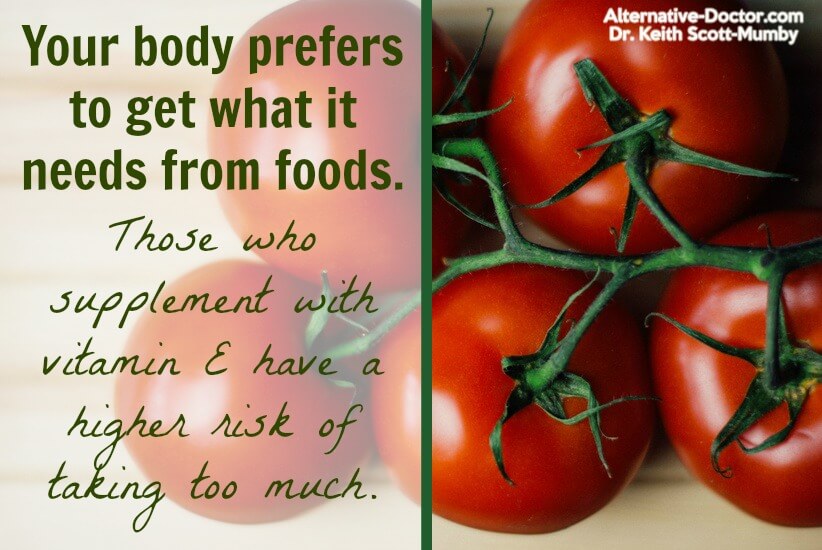The benefits of vitamin E have been proven time and time again. This fat-soluble antioxidant is required for your body to utilize vitamin K and is essential to many basic functions.
Though vitamin E deficiency is rare in developed countries, those who have difficulties absorbing fat are at higher risk. Experts estimate that while deficiency is uncommon, most people aren’t getting enough.
Signs of Vitamin E Deficiency
- Decreased muscle mass
- Loss of strength in muscles or muscle cramps
- Liver disease
- Lack of coordination
- Kidney dysfunction
- Difficulty with vision, cataracts, and ocular paralysis
- Anemia
- Damage to brain cells or neurological defects
- Low libido
- Infertility or other reproduction issues
- Gastrointestinal distress
- Hair loss or dry skin
- Slow wound healing
Your body needs the benefits of vitamin E. It has powerful antioxidant activity that helps fight the effects of oxidation and free radicals. It is also essential to your immune system as well as the health of your blood vessels.
Potent Activity of Vitamin E
There are many fantastic studies that focus on what vitamin E does in your body. Here are a few of the most prominent actions this essential vitamin makes possible.
- Prevention of diabetes
- Control of blood sugar
- Improves blood flow
- Helps lower risk of clogged arteries
- Liver health
- Vision protection
- Improve symptoms of altitude sickness
- Cell membrane protection
- Increases production of prostaglandins that regulate blood pressure
- Lowers risk of cataracts
- Muscle repair
Oxidative stress is understood more every year and the destruction it causes affects every cell in your body. The natural process of oxidation spins out of control and results in unchecked inflammation. Antioxidants found in food have shown effective against oxidation and oxidative stress. They help to safeguard your central nervous system.
Chronic inflammation has far-reaching repercussions that include damage to the brain cells. For several years, oxidative stress and chronic inflammation have been named as bio-markers for Alzheimer’s disease.
In a recent study from Erasmus Medical Center in the Netherlands found that vitamin E may be protective against Alzheimer’s disease and other forms of dementia. Their results were published in the Archives of Neurology journal.
Their assessment spanned almost a decade and included more than 5,300 men and women over the age of 55 who showed no signs of dementia at the onset of the study. They focused on key vitamins and nutrients in subject diet.
More than 9 years later, 465 of the study participants were diagnosed with dementia. All but 100 of those were diagnosed with Alzheimer’s disease.

Researchers adjusted their data to reflect specific factors and discovered that one-third of the participants who consumed the most vitamin E in their diet had a 25% lower risk of dementia than the one-third who consumed the least of the vitamin.
Authors of the study explained their focus. “The brain is a site of high metabolic activity, which makes it vulnerable to oxidative damage, and slow accumulation of such damage over a lifetime may contribute to the development of dementia.”
The key bio-marker of Alzheimer’s is known as beta-amyloid. It is the primary compound of the plaques that form in the brains of Alzheimer’s patients.
“When beta-amyloid accumulates in the brain, an inflammatory response is likely evoked that produces nitric oxide radicals and downstream neurodegenerative effects. Vitamin E is a powerful fat-soluble antioxidant that may help to inhibit the pathogenesis of dementia.”
Getting Enough Vitamin E
Your body prefers to get what it needs from foods. Those who supplement with vitamin E have a higher risk of taking too much.
That is not a risk when you eat your vitamins. There are many excellent food sources of vitamin E and many are easy to add to your daily nutritional plan.
Food Sources of Vitamin E
- Wheat germ
- Eggs
- Nuts (walnuts, almonds, peanuts, and hazelnuts)
- Sunflower seeds
- Leafy vegetables (Swiss chard, spinach, assorted greens, and kale)
- Avocado
- Asparagus
- Olive oil (cold pressed) and olives
- Fatty fish (salmon, cod, shrimp, and sardines)
- Tomatoes
- Bell and chili peppers
- Cranberries and raspberries
A word of caution for those who are currently taking prescribed blood thinners. Talk to your doctor before increasing your intake of vitamin E (if you’re getting it from a supplement). Supplementation may increase your risk of bleeding.
Supplement vitamin E also interferes with the absorption of pharmaceutical anti-depressants, anti-psychotics, aspirin, and AZT (medicine used to treat HIV/AIDS).
If you’re being treated for high blood pressure or cholesterol, supplementing with vitamin E can lower the effect of these meds (while food sources are excellent for blood pressure and cholesterol). On the opposite side of that coin, many prescriptions lower your ability to absorb vitamin E.
You need the benefits of vitamin E and supplements aren’t the best place to get it. Your diet, your diet, your diet will almost always be my answer to your question about increasing antioxidants (and antioxidant activity) in your body!
